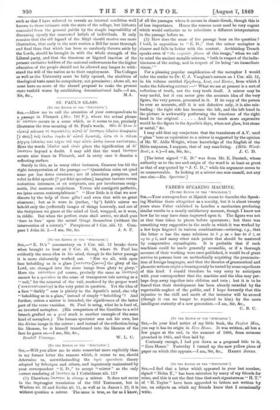ST. PAUL'S GLASS.
[TO THE EDITOR OF THE "SPECTATOR.")
Sra,—Allow me to call the attention of your correspondents to a passage in Plutarch (Mor. 781 F.), where the actual phrase ioiTrpoll occurs in a sense which, as it seems to me, precisely illustrates the true meaning of St. Paul's words. Oiov Si ;Poo ip
obpavii isipuga. ri ,rgpixa,XXi; 61' it:wimpy gawXoy etvapaivEt 0E6;1 re-1'c ixthoy ivophs131 ahrofi buyaro4, 61-4.1 rh iv ,,r6Xem pins; luontio4 zed Myou roi; Imp; aisr6y cZalrEp incova. zariorvrEv. Here the words libaaov and sizo'n, place the signification of bt' iaorrpou beyond a doubt. I may add that the word Itnorrpov occurs nine times in Plutarch, and in every case it denotes a reflecting surface.
Surely in this, as in many other instances, Erasmus has hit the right interpretation of the passage :—" Quantulum enim eat quod nuns per has dotes cernimus ; nee id admodum perspicue, sed velut in fidei speculo [? per fidei speculum] imagines tantum verum ccelestium intuemur, et ex scripturis, ceu per involucram cenig- matis, Dei mentem conjicimua. Verura ubi contigerit perfectio, res ipsas coram contemplabimur." "How little is it that we now discern by the help of these gifts ! and even that with no great clearness ; but as it were in (rather, 'by') faith's mirror we behold only the (reflected) images of things heavenly, and out of the Scriptures we guess at the mind of God, wrapped, as it were, in riddle. But when the perfect state shall arrive, we shall gaze 'face to face' upon the actual things themselves (without the intervention of a mirror)." Paraphrase of 1 Cor. xiii. 12. Com- pare 1 John iii. 2.—I am, Sir, &c. J. S. P.






























 Previous page
Previous page